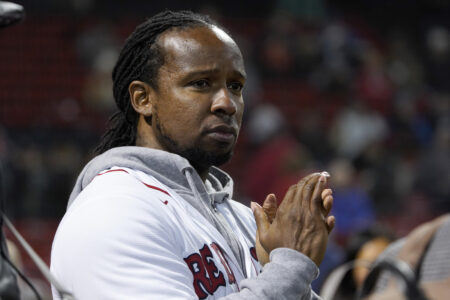If someone gave you $40 million and an ESPN deal, it would be awfully difficult to fumble as hard as Ibram X. Kendi did.
Kendi, whose birth name before he successfully re-branded himself was Ibram Henry Rogers, is in lukewarm (if not) hot water with Boston University for alleged “mismanagement of funds” and “disorganization” at his three-year-old Center for Antiracist Research (CAR).
Back during 2020’s “mostly peaceful” summer of rioting, arson, looting, and murder, institutions of higher learning became obsessed with the idea that they could buy their way out of being cancelled. So Boston University’s plenary indulgences took the form of establishing a multi-million-dollar hub for all things “anti-racism” headed by celebrity race hustler Kendi.
Research put out by the CAR in the past three years includes a database of COVID-19 cases by ethnicity and… that’s about it.
Kendi issued a sugar-coated, heavily euphemized announcement on social media detailing his decision to “restructure” (salvage) the Center to “ensure long-term sustainability” (avoid bankruptcy). Bottom line: Kendi laid off more than 20 employees, half his payroll.
He blamed the substantial layoffs on the Center’s “pandemic” beginnings and the notion that “leaders of color” are “often held to different standards.”
Let’s be clear. The CAR received over $40 million in no-strings-attached funding and a bagful of baseless awards – more even than Monica Cannon-Grant, the Roxbury BLM advocate who is now indicted on federal fraud charges (including welfare ripoffs) involving millions of dollars.
The “standard” Kendi was required to meet was to break even and publish a few studies. If all this racism is as free-flowing and systemic as Kendi and his disciples claim, why couldn’t the CAR hold it together?
Despite evident failure, this racket is far from over for Ibram X. Kendi. After kicking his fellow “scholars” to the curb, he will remain as the Center’s director, on BU salary. Now, he even has a fallback in the professional sports industry after a project to unveil the horrors and injustices in professional sports.
Within days of the BU bad news, Kendi announced the release of his collaboration with streaming service ESPN+, a series titled Skin in the Game.
ESPN is of course another money-losing subsidiary of the uber-woke Disney corporation. Disney is trying to dump the whole catastrophic operation, but so far, no takers.
This latest woke Disney disaster features five 20-minutes episodes of mostly nonsensical claims about white Americans’ perceptions of minorities in sports.
Almost a third of MLB rosters are made up of Latino players, and most of the NFL and NBA players are black. Yet Kendi had a difficult time finding professional athletes who would participate in the docuseries on professional athletes.
Instead, Kendi employed celebrities and so-called journalists, like Michelle Williams of Destiny’s Child and far-left “journalist” Jemele Hill, whose recent work includes highlighting the “glorious exuberance or Sha’Carri Richardson’s hair.” If you’re thinking to yourself, Gee, that Jemele Hill character sounds familiar, you would be correct.
When it comes to identity politics miniseries, Hill sure does get around. She had a key role in Hillary and Chelsea Clinton’s Gutsy project, highlighting women (and transgenders) who help perpetuate narratives of gender oppression.
In Skin in the Game, Kendi seeks to reveal the alleged pervasiveness of racism in sports.
Every episode begins with Kendi, clad in a teal linen jacket, getting comfortable in a mid-century leather armchair and tapping his fingertips together. A voiceover reminds us that while he’s known as an “anti-racist author and scholar” Henry, er Kendi, is really just a kid from Queens who loves confronting racism!
The first two episodes were nothing to write home about, except for when hammer-throw Olympian Gwendolyn Berry calls professional athletes “literally the new slaves.” Sports contracts are “chains.”
For the record, Berry’s net worth is estimated somewhere around $5 million.
Other than that, Kendi tries to drive home the concept that athletes “of color” are trolled on social media when they decide to post something political. The mothers and wives of the very few athletes featured are much more ready to smile for the camera and denounce the system as oppressive.
Episode 3 is where Kendi really pushes the envelope. This chapter looks at the “racism” dealt with by black female athletes. Kendi opens with the claim that members of this niche demographic, in some ways, hold the “weight of the world” on their shoulders.
The episode features one black female professional golfer who went through a putting slump and bounced back one season later.
Episode 4 makes more wild, unbacked claims: “People are saying Latino players are bad for baseball.” Perhaps if the CAR did any meaningful research, Kendi could back up such claims without having to play audio from the 1970s.
Kendi denounces baseball announcers’ use of “Bobby” when referring to Roberto Clemente and the phrase “broken English” when describing his post-game interviews. Then, he decries rules against “excessive celebration” as nasty forced assimilation.
As much as Kendi’s team tried, this episode seems only to point to a litany of Latino success in the declining sport. More good news: they have stopped calling people “Latinx.”
The lack of substance throughout the series is palpable, and ESPN (and even Disney) may be embarrassed by Kendi’s recent stunt. Sports publication Outkick suggests ESPN+ might be shadow banning their own series.
If Kendi is smart (still unconfirmed), he will go underground for a few years and try to survive BU’s “inquiry” (though under BU’s new even more woke leadership, the investigation will likely be broomed). He should seek out new targets – more suburban, guilt-ridden, virtue-signaling billionaires who went to the Ivy League as legacies.
If his books still appear on shelves, Rogers may continue to label himself an author. If colleges allow him to “teach,” he may brag that he’s an educator. If his “scholarship,” such as it is, continues to win awards from Leftist-entrenched Fellowships and Guilds, he may label himself an award-winner.
He will continue to count on the young and malleable wannabe comrades and fellow travelers not to look further into why the Center for Antiracist Research really collapsed. It would be racist to even ask questions.
Just ask Kendi. Most of the trust-funders won’t. And so Kendi’s grift will live on.
Somewhere in her new suburban digs in Taunton awaiting trial on federal corruption charges, social justice warrior Monica Cannon-Grant must be asking herself, where the hell did I go wrong?


